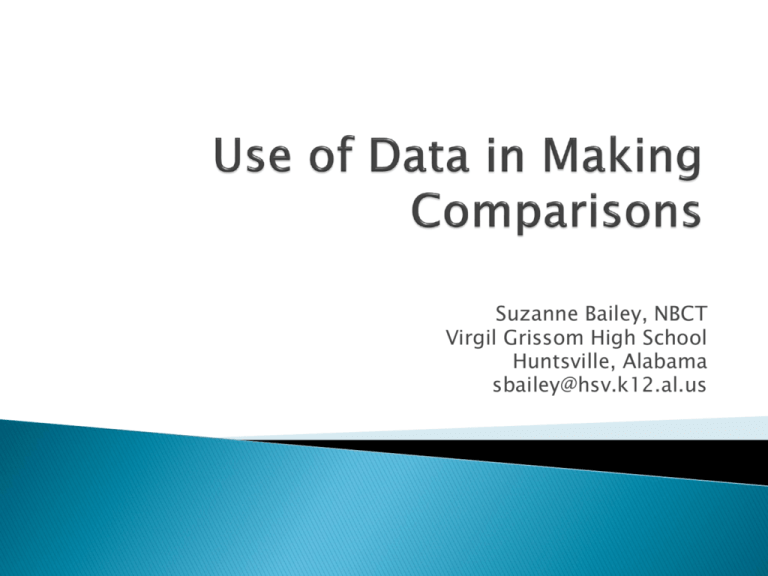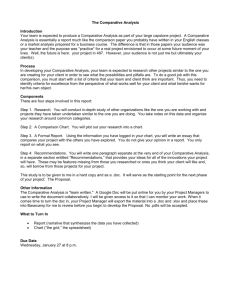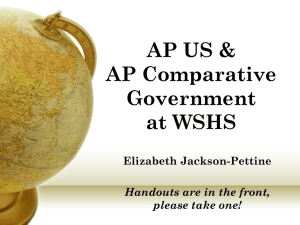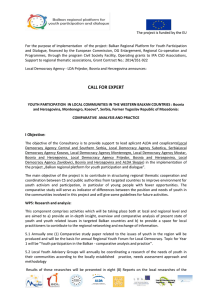Use of Data in Making Comparisons
advertisement

Suzanne Bailey, NBCT Virgil Grissom High School Huntsville, Alabama sbailey@hsv.k12.al.us According to the Course Outline, it is a major goal of the course. Students successfully completing this course will be able to analyze and interpret data relevant to comparative government and politics. Students successfully completing this course will: ◦ Understand major comparative political concepts, themes, and generalizations. ◦ Have knowledge of important facts pertaining to governments and politics of China, Great Britain, Iran, Mexico, Nigeria, and Russia. ◦ Be able to compare and contrast political institutions and processes across countries and to derive generalizations. Step One: ◦ Start with the Course Description Outline. ◦ Identify which concepts are measurable. ◦ The key is to look at quantifiable outcomes of a clearly defined concept. Step Two: ◦ Actively search for comparative data in textbooks, journals, news articles, and websites. ◦ Look for empirical (quantitative, factual) data from reliable sources. ◦ Enhance with qualitative examples. Step Three: ◦ Craft strategy which requires student to analyze and evaluate evidence. ◦ Be sure to have students identify trends. ◦ Challenge students to manipulate data and use it to support generalizations. Step One: Define concept. Greek origins: rule by the people Lincoln: government by the people and for the people Almond/Powell: ◦ Political system in which citizens enjoy a number of basic civil and political rights, and which their most important leaders are elected in free and fair elections and are accountable under a rule of law. Process by which citizens of a state acquire both procedural and substantive rights. ◦ See Democratization Briefing Paper on AP Central ◦ http://apcentral.collegeboard.com/apc/public/repo sitory/ap05_comp_govpol_demo_42252.pdf FREEDOM OF EXPRESSION AND BELIEF 1. Are there free and independent media and other forms of cultural expression? (Note: In cases where the media are state controlled but offer pluralistic points of view, the survey gives the system credit.) Does the government directly or indirectly censor print, broadcast, and/or internet-based media? Is self-censorship among journalists common, especially when reporting on politically sensitive issues, including corruption or the activities of senior officials? Does the government use libel and security laws to punish those who scrutinize government officials and policies through either onerous fines or imprisonment? Is it a crime to insult the honor and dignity of the president and/or other government officials? How broad is the range of such prohibitions, and how vigorously are they enforced? If media outlets are dependent on the government for their financial survival, does the government withhold funding in order to propagandize, primarily provide official points of view, and/or limit access by opposition parties and civic critics? Does the government attempt to influence media content and access through means including politically motivated awarding of broadcast frequencies and newspaper registrations, unfair control and influence over printing facilities and distribution networks, selective distribution of advertising, onerous registration requirements, prohibitive tariffs, and bribery? Are journalists threatened, arrested, imprisoned, beaten, or killed by government or nongovernmental actors for their legitimate journalistic activities, and if such cases occur, are they investigated and prosecuted fairly and expeditiously? Are works of literature, art, music, or other forms of cultural expression censored or banned for political purposes? Freedom in the World 2009 Edition Edition: To view Freedom in the World reports, select a year from the pull down menu above. Note that each edition of Freedom in the World reflects developments that took place in the previous calendar year. NEW: On January 12, 2010, Freedom House released the findings (political rights and civil liberties scores) for Freedom in the World 2010. The full survey, including the individual country reports, will be available in late spring 2010. About the Survey Freedom in the World, Freedom House’s flagship publication, is the standard-setting comparative assessment of global political rights and civil liberties. Published annually since 1972, the survey ratings and narrative reports on 193 countries and 15 related and disputed territories are used by policymakers, the media, international corporations, civic activists, and human rights defenders to monitor trends in democracy and track improvements and setbacks in freedom worldwide. The Freedom in the World data and reports are available in their entirety on the Freedom House website. Comparative and Historical Data Please click here to access a range of comparative and historical Freedom in the World data, including charts displaying the status and ratings of countries and territories from 1972 to the present, as well as aggregate and subcategory scores, and information on electoral democracies. Craft strategies to have students marshal evidence to document and support generalizations. ◦ Suggestions: Create graph of data over time—identify trends! Compile information on survey questions/methodology—create a shorter checklist. Design graphic organizer: assess relationships: distinguish between correlation and causal ones. Develop a timeline: analyze links to historical events and specific policies. For democracy: try the Polity IV index of democracy and autocracy. http://www.systemicpeace.org/polity/polity4. htm Students will use their data analysis skills on both the multiple choice and essay portions of the exam. The key is precision. ◦ Students should: Pay careful attention to the prompt and the assigned task. Clearly define a concept. Apply and/or assess the appropriate measure. Analyze trends and relationships between concepts. Make a connection with a specific example. Concept: State: ◦ www.worldmapper.org ◦ www.cia.gov/library/publications/the-worldfactbook ◦ www.nationmaster.com Concept: Political Culture: ◦ http://pewglobal.org ◦ www.worldvaluessurvey.org Concept: Election Systems: ◦ www.electionguide.org Governance: ◦ http://info.worldbank.org/governance Concept: Civil society (social capital): ◦ www.hks.harvard.edu/saguaro Concept: Development ◦ ◦ ◦ ◦ www.worldbank.org www.undp.org www.gapminder.org www.census.gov/ipc






